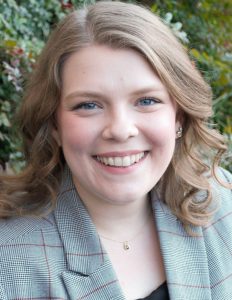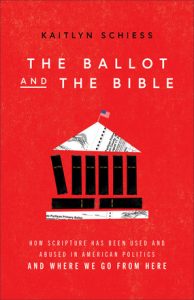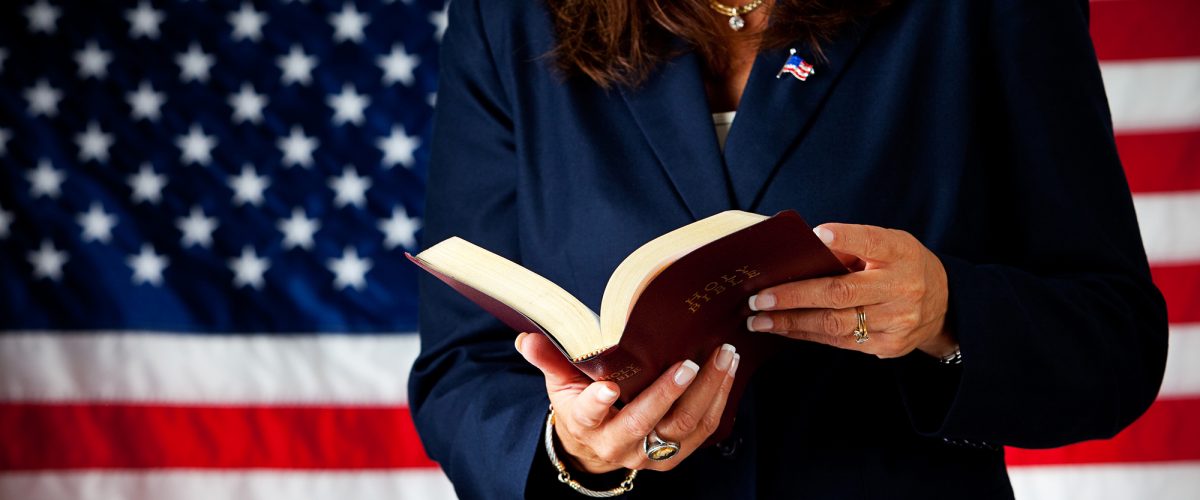“Go pick up a Bible off your shelf and read it. … That’s my worldview,” said newly elected U.S. speaker of the House Mike Johnson when asked how he would weigh the many issues he confronts.
Johnson joins a long and colorful historical parade of American political figures publicly affirming their alignment with God’s word, a parade Bible scholar and writer Kaitlyn Schiess explores in her compelling book, The Ballot and the Bible: How Scripture Has Been Used and Abused in American Politics and Where We Go from Here.
Combining American history and a reader-friendly approach to hermeneutics and biblical interpretation, Schiess ushers readers from the Puritan pilgrims to evangelicals’ loving embrace of Donald Trump.

Kaitlyn Schiess
Schiess is a writer, speaker and theologian and a regular cohost on the “Holy Post” podcast with Skye Jethani and Phil Vischer. She currently is a doctoral student in political theology at Duke Divinity School.
The book is a fun read that teaches valuable lessons about history, theology and Americans’ propensity for seeing themselves as God’s new “chosen people.” Readers may find it particularly helpful as we enter a presidential election cycle that promises plenty of Scripture twisting.
The problems inherent in politically inspired Bible teaching were apparent early on. John Winthrop’s “city on a hill” sermon, delivered in 1630 on a ship bound for the New World, was the first of many to creatively take God’s promise to Solomon and apply it to America: “If my people, who are called by my name, will humble themselves and pray and seek my face and turn from their wicked ways, then I will hear from heaven, and I will forgive their sin and will heal their land” (2 Chronicles 7:14).
Winthrop’s misuse of Jesus’ words to his disciples about being “the salt of the earth,” “the light of the world,” and “a city on a hill” is equally awkward.
But the phrase stuck and has been used ever since, perhaps never more frequently than by Ronald Reagan and other Cold Warriors. “What began as a religious call for right living … became a defense of American exceptionalism,” Schiess writes.
In the Trump era, Jesus’ teaching that believers should “give unto Caesar what is Caesar’s” has become “a warped version of ‘two kingdoms’ theology” that legitimizes believers who make political decisions entirely contrary to their faith’s moral teaching, she says.
Schiess declares such shifts reveal “the besetting sin of American political theology … we pluck promises of provision or judgment that were given to Israel or the church and apply them wholesale to America.”
She explains: “We are often narcissistic and nationalistic readers, seeing our own nation as the subject of every promise or command.”
“Our binary thinking blinds us to the way Scripture confronts our favored party or policy.”
“We all read the Bible with inevitable glasses on,” she adds. “Our binary thinking blinds us to the way Scripture confronts our favored party or policy.”
The Ballot and the Bible takes readers on a guided tour of key periods in American history, showing the many ways believers have used and abused key passages.
In the lead-up to America’s war of independence, revolutionaries cited passages about the freedoms Christ brings while loyalists cited passages about submission to divinely ordained authorities.
During the Civil War era, both slaveholders and abolitionists cited Philemon, but the pro-slavery faction relied most on “the curse of Ham” in Genesis as they argued for racism as part of a “divine moral order that required slavery.”
The Social Gospel movement of the early 20th century was a progressive form of Christian nationalism, she says, that equated “the nation and the kingdom” while preaching a gospel of “middle-class idealism,” chauvinism and Manifest Destiny.
Sermons by Civil Rights leader Martin Luther King Jr. overflowed with Scripture references, especially the exodus story and the liberation messages of the Old Testament prophets. But unlike many other leaders who use the Bible to further their causes, King also “read Scripture against America” in ways that shined a light on some of the nation’s sins.
 Advocates of both small government and greater government intervention on behalf of the poor find supportive passages galore for their economic ideas.
Advocates of both small government and greater government intervention on behalf of the poor find supportive passages galore for their economic ideas.
Hal Lindsey’s influential Late Great Planet Earth taught a generation of evangelicals a current-events style of interpreting the book of Revelation that replaced prophets denouncing human sin with prophecies as predictive puzzles. Just about every precise prediction Lindsey ever made turned out completely wrong, but his lasting influence — amplified by bestselling prophetic fiction like the “Left Behind” novels and movies — still can be seen in American evangelicals’ love for Israel and disdain for Palestinians.
Younger readers will enjoy the chapter that contrasts George W. Bush’s private and personal faith with Barack Obama’s more public gospel pronouncements, showing how evangelicals favored the president who never mentioned Jesus in his National Prayer Breakfast speeches over the one who peppered his talks with numerous explicit and personal Christian references.
Schiess surveys the impact of five centuries worth of Bible-quoting leaders in this “Bible-haunted land,” concluding they have largely overlooked “the clearest teaching of the Bible regarding politics … that we treat our opponents fairly.”
Her primary concern in the book isn’t politics or history. She wants us to exhibit a bit of “hermeneutical humility” about the ways we exploit Scripture and strive to learn what it is teaching us.
That’s difficult because “many of us are more shaped by our political hermeneutics than our theological traditions,” she says. But Schiess, the author of a previous book about politics and practical theology (The Liturgy of Politics: Spiritual Formation for the Sake of Our Neighbor) isn’t giving up.
“I hope these chapters deepen our desire to be shaped by Scripture — to allow the language, images and grand story of this marvelous book to impact every area of our lives, including the few but important moments we spend in a voting booth,” she says.
Related articles:
For the Bible tells me so: The Bible and the Civil Rights movement | Opinion by Kaitlyn Schiess
Journalist’s book explores ‘crack-up of the American evangelical church’
My argument in Defending Democracy from its Christian Enemies | Opinion by David Gushee
In biblical truth-telling, we need to mind the gap between clergy and laity | Opinion by Mark Wingfield


